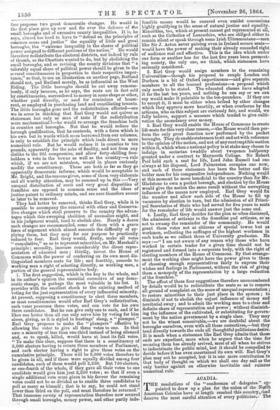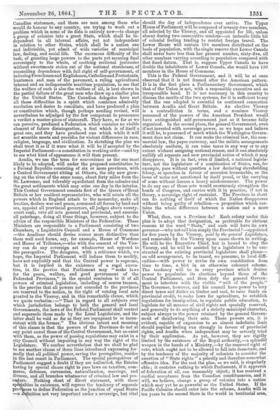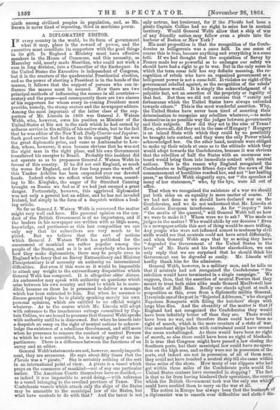Canadian statesmen, and there are men among them who would
do honour to any country, are trying to work out a problem which in some of its data is entirely new—to change a group of colonies into a great State, which shall be in- dependent in all internal affairs, yet not independent in relation to other States, which shall be a nation one and indivisible, yet admit of wide varieties of municipal law, feeling, and social life. The enormous difficulty of the task, of granting large powers to the parts yet securing final sovereignty to the whole, of soothing sectional jealousies without sweetmeats stolen out of the national storehouse, of reconciling dependence with full right of self-government, of inducing Frenchmen and Englishmen, Catholics and Protestants, huntsmen and men of the pavement, a ruling agricultural interest and an indispensable maritime population, to see that the welfare of each is also the welfare of all, is best shown in the partial failure of the great men who drew up a similar plan for the United States. The Canadian delegates have met all these difficulties in a spirit which combines admirably resolution and desire to conciliate, and have produced a plan or constitution which, though perhaps needing revisal, will nevertheless be adjudged by the few competent to pronounce a verdict a master-piece of statecraft. They have, so far as we can perceive, produced a Federation which contains no visible element of future disintegration, a feat which is of itself a great one, and they have produced one which while it will not erumble meets and provides for violent differences in race, religion, language, and civilization. In sketching the plan we shall treat it as if it were what it will be if accepted by the Imperial Parliament—a constitution in working order--and try to see what kind of appearance it will then present.
Acadia, we use the term for convenience as the one most likely to be adopted, will under the proposed constitution be a Federal Republic consisting of six or more provinces, with a Central Government sitting at Ottawa, the city now grow- ing on the river of the same name, about forty miles from the St. Lawrence, and tolerably equidistant from the colonies and the great settlements which may arise one day in the interior. This Central Government consists first of the Queen of Great Britain or her resident representative, who will retain all the powers which in England attach to the monarchy, make all treaties, declare war and peace, command all forces by land and sea, appoint all provincial governors, all judges above county- court rank, veto all acts general and provincial, and exercise all patronage, doing all these things, however, subject to the advice of the respontible Ministers of the Federation. These Ministers are responsible to a Parliament consisting of two Chambers, a Legislative Council and a House of Commons —the Acadians should devise names more distinctive than these well used forms, say, for example, House of Wardens and House of Tribunes,—who with the consent of the Vice- roy can do any sovereign act whatsoever not opposed to the prerogative. The delegates, with a reticence which, we hope, the Imperial Parliament will induce them to modify, have not explicitly said that the Central power is supreme, but it is implied in the existence of a regal execu- tive, in the proviso that Parliament may "make laws for the peace, welfare, and good government of the Federated Provinces," in the special remission to it of all powers of criminal legislation, including of course treason, in the proviso that all powers not conceded to the provinces are reserved to the nation, in the right of vetoing local acts granted to the Viceroy, and in this remarkable clause, which we quote verbatim :—" That in regard to all subjects over which jurisdiction belongs to both the general and local Governments, the laws of the Federal Parliament shall control and supersede those made by the Local Legislature, and the latter shall be void so far as they are repugnant to or incon- sistent with the former." The obvious intent and meaning of this clause is that the powers of the Provinces do not at any point annul those of the Central Government, but co-exist with them, as the power of passing regulations may exist in a city Council without impairing in any way the right of the Legislature. We confess nevertheless that we shall be glad to see another clause of three lines introduced expressing for- mally that all political power, saving the prerogative, resides in the last resort in Parliament. The special prerogatives of Parliament suggest a doubt if they are unlimited, the Estates having by special clause right to pass laws on taxation, com- merce, defences, currencies, naturalization, marl inge, and divorce, and all branches whatsoever of criminal law and pro- ure. Nothing short of direct statement, with these 'alties in existence, will repress the tendency of separate ces to define Federation as the junction of equal States nition not very important under a sovereign, but vital
sp pro —a
should the day of independence ever arrive. The Upper House of Parliament will be composed of seventy-two members, all selected by the Viceroy, and all appointed for life, unless absent during two consecutive sessions—an imbecile little bit of colonial feeling tending to restrict foreign travel. The Lower House will contain 194 members distributed on the basis of population, with the single reserve that Lower Canada shall never have less than her present number, sixty-five, all other numbers varying according to population compared with that fixed datum. That is, suppose Upper Canada to have double the inhabitants of Lower Canada. she would have 130 members in the House of Commons.
This is the Federal Government, and it will be at once observed that it is not framed after the American pattern. It is in the first place a Parliamentary Government, which that of the Union is not, with a responsible executive and an irresponsible head. It is not necessary in this country to discuss the merits of the two systems, for it is sufficient to say that the one adopted is essential to continued connection between Acadia and Great Britain. An elective Viceroy is a contradiction in terms, and a nominee Viceroy possessed of the powers of the American President would have extinguished self-government just as it became fully organized. In the second place, the general Government, even if not invested with sovereign power, as we hope and believe it will be, is possessed of much which the Washington Govern- ment does not claim. It can make the criminal law, the com- mercial law, the paper currency, and the militia arrangements absolutely uniform, it can raise taxes in any way or to any extent without assigning national reason, and it can absolutely nullify all separate and new provincial action of which it may disapprove. It is in fact, even if limited, a national legisla- ture, not the legislature of a combination of States, can, for example, pass without question a law declaring slaveholding felony, or speeches in favour of secession treasonable, or the issue of notes not sanctioned by itself penal, or the carrying of arms without licence a heavy misdemeanour. The power to do any one of those acts would enormously strengthen the hands of Congress, and carries with it in practice, if not in theory, a sovereign right of restraint. The Province in short can do nothing of itself of which the Nation disapproves without being guilty of rebellion—a proposition which con- tains the whole difference between a nation and a mere Union.
What, then, can a Province do ? Each colony under this plan is to adopt that designation, as preferable for obvious reasons td the word " State," and each will have its own governor—why not call him simply the Provincial ?—appointed for five years by the Viceroy, paid by the general Legislatuee, and removable by the Viceroy upon cause shown in writing. He will be the Executive Chief, but is bound to obey the Viceroy, and he will be assisted by a legislature to be con- structed as the existing provincial legislature shall please— an odd arrangement, to be traced, we presume, to local diffi- culties—with power to revise its own constitution from time to time, a blot in an otherwise coherent scheme. The tendency will be in every province which desires power to popularize its elections beyond those of the Central Parliament, and then defy the general Govern- ment to interfere with the visible " will of the people." The Governor, however, and his council have power to levy direct taxes and duties on timber and coal, to raise funds on provincial credit, to make laws for agriculture, to establish regulations for immigiation, to regulate public education, to legislate for all manner of civil rights not specially reserved, and generally to do anything of a strictly municipal character, subject always to the power retained by the general Govern- ment of disallowing their acts. These powers are, it is evident, capable of expansion to an almost indefinite limit
should popular feeling run strongly in favour of provincial rights, and Acadia when independent may be severely tried by their application. As yet, however, they are rigidly limited by the existence of the Royal authority,—a splendid weapon in the hands of a Ministry,—by the reserved right of veto, which ought not to be allowed to fall into desuetude, and by the tendency of the majority of colonists to consider the assertion of" State rights" a priestly and therefore somewhat offensive idea. For the rest the plan, as we said,. is singularly
able ; it contains nothing to which Parliament, if it approves of federation at all, can reasonably object; it has received .a.
cordial acceptance from the Canadian constituencies, and it will, we believe, change a group of colonies into a nation which may yet be as powerful as the United States. If the Pacific Colonies should enter into the scheme, Acadia will in ten years be the second State in the world in territorial area, ninth among civilized peoples in population, and, as Mr. Brown is never tired of repeating, third in maritime power.




































 Previous page
Previous page